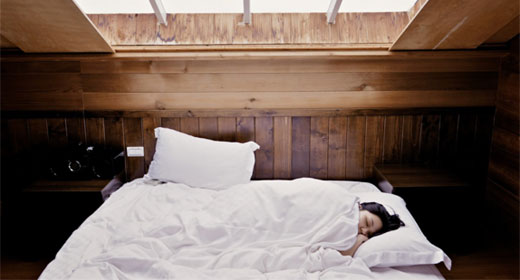by Laurie Larson: Let’s face it: life is insanely hectic.

It’s easy to get caught up in the hustle and bustle of a fast-paced world and let some of your priorities slip. Some weeks get so busy that by the end of it you realize you forgot to ever call your mom. You may even start to feel tension in your closest friendships when you stop prioritizing them.
When a busy life starts to get in the way, you have to remember the importance of stepping back and focusing on all aspects of your life. For a fully balanced life, your relationships and your own personal health should never go forgotten. One of the most important relationships you should be especially sure to never neglect is the relationship you have with your sleep.
The importance of a good night’s rest
Your sleep is not something you should take lightly. Without it, every other part of your life will suffer.
If you regularly start losing out on sleep, you can experience sleep deprivation, insomnia, or other sleep disorders. The dangers of these conditions can be very serious.
While the effects of staying up too late a few nights a week may just start with feeling drowsy and having trouble concentrating during the day, the health risks of losing sleep consistently can escalate to serious issues such as obesity, high blood pressure, and other heart conditions.
Not only will your physical health be at risk, but your mental health will be too. When you experience sleep deprivation, you become susceptible to increased anxiety, mood changes, and depressive disorders.
The toll sleep deprivation has on your mental state on a daily basis can even be as serious as being intoxicated. Research on driving while drowsyshows that going without sleep for 18 hours straight gives you the equivalent feeling of having a blood alcohol level of .05 (as a reference, .08 is classified as drunk).
You may not realize that losing sleep can lead to more than a few yawns and heavy eyelids the next day. In order to best protect your health and live a better life, you need to make sure you’re getting the rest your body needs.
 Source: Pixabay
Source: Pixabay
So you know you need to repair your sleep, but you don’t know how to actually go about prioritizing your sleep.
The recommended amount of sleep that a healthy adult should be experiencing each night is between seven and nine hours. The first thing you should do is figure out what time you should be going to sleep each night in order to have at least seven hours of quality sleep by the time you have to wake up. Sounds easy right? Not always.
You aren’t going to be able to just hop in bed and immediately knock out (unless you have narcolepsy) so you need to develop a wind-down routine that helps signal to your mind and body that it’s time to start relaxing.
Your wind-down routine should start at least 1-2 hours before your scheduled bedtime. This means, you should shut down your electronics that emit stimulating blue light and turn down the overhead lights. Our body’s circadian rhythm and melatonin productionresponds directly to the amount of light we are exposed to, so make sure your evenings are filled with soft lowlights to tell your body it’s time for bed.
Practicing some light yoga stretches or meditating in the evening can be a great part of your wind-down routine where you stretch out your muscles and ease your mind. Diffusing essential oils in the air can also help calm you for a good night’s rest.
Once you get your wind-down routine set, stick to it. A consistent routine of going to sleep and waking up at the same time each day is just what your body needs. If you have a regular wind-down routine, it will train your mind and make falling asleep a breeze.
Tips for getting your best sleep
To improve the quality of your sleep, you should focus on the factors that are getting in your way.
Temperature control is vital to getting quality sleep. Our bodies require a temperature drop to enter deep sleep each night. To prepare for this, keep your bedroom between 60 and 67 degrees. Also, make sure you aren’t trapping your heat in your bed. A breathable mattress and bedding will ensure you aren’t sweating in your sheets and compromising on your sleep.
Speaking of your bed, you may be sleeping on a mattress that is stealing your sleep from you. If you regularly wake up in pain, feel groggy in the morning, or notice that your once filled-out mattress is now sagging, it may be time for a new bed. Know the signs you need a new mattress and do your research on the factors to consider to personalize your bed to your sleeping needs.
There may be a simple problem ruining your sleep with an easy fix. If light-sensitivity is an issue, you should look into blackout curtains that prevent light pollution from entering your sleep haven. Disruptive noises could also be disturbing you in the night, so make sure you prepare for your needs and use a white noise machine to mask outside sounds.
Whatever you do, never let anything get in the way of getting quality, consistent sleep.
Author’s bio: Laurie Larson is a freelance writer from Durham, NC who has a passion for healthy living and helping others find ways to dedicate time to their own health.









































